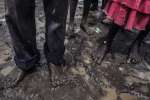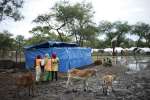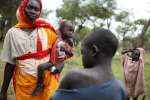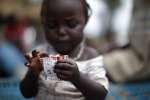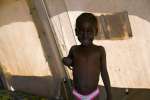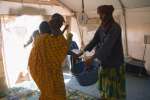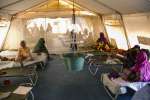Success and challenges as UNHCR tackles neglected health issues
News Stories, 16 July 2008

GENEVA, July 16 (UNHCR) – When António Guterres visited refugee camps soon after becoming UNHCR High Commissioner in 2005, he discovered what many staff on the ground already knew: in too many places the agency was not devoting sufficient resources to protect the health of refugees.
The result was "The High Commissioner's Special Project," a fund outside of the normal country budgets. It was established in 2007 to pay for programmes to improve health, nutrition and the response to sexual and gender-based violence (SGBV) in refugee camps in 19 countries showing the greatest need.
Other countries were added this year as the first programmes were incorporated in the annual UNHCR country planning, and by 2009 UNHCR offices in all countries must ensure that these types of programmes are included in their own budgets.
"The High Commissioner saw for himself the conditions. He made it clear this is a protection issue," said Paul Spiegel, who oversees UNHCR's public health programmes from Geneva.
The initiative has produced some dramatic improvements.
Improved food distribution, including an infant-feeding programme, saw a one-year fall in acute malnutrition in Kakuma Camp in Kenya from 20.5 percent to 11.2 percent. In Myanmar, the coverage of complete antenatal care rose from 32 percent to 59 percent during 2007. In Ali-Adeh camp in Djibouti, per capita water supplies were increased from 12.5 litres per day to 16.6 litres.
In Kakuma, providing school uniforms helped raise the daily school attendance by girls from 53 percent to 80 percent last year. Victims of SGBV were given new support in many countries from Azerbaijan to Malta to Panama.
By the end of 2007, more than 95 percent of the US$15.3 million allocated to the new initiative had been spent. The majority, US$11.25 million, went for health and nutrition improvements in four countries in Africa (Djibouti, Ethiopia, Kenya and eastern Sudan) and three in Asia (Bangladesh, Myanmar and Nepal). The rest went on SGBV assistance in 14 countries around the world. The budget for this year is US$7.5 million.
The extent of the problems could not even be identified until UNHCR established functioning health information systems to assess the needs. These failures in protracted refugee situations reflected chronic underfunding that is now being tackled – first on the urgent basis by using the High Commissioner's Special Project and then by addressing the needs through incorporating them in annual country budgets.
Spiegel readily admits much more must be done. While the water supply has improved in Djibouti, it still falls below the UNHCR daily standard of 20 litres of water per person. And anaemia rates – reflecting an inadequate diet – are disturbingly high in several countries. In Kakuma, while other statistics were improving, the rate of anaemia among children rose last year from 79 percent to 83 percent.
"It's not all a success – we have problems," said Spiegel. Progress is often uneven, local customs can be formidable obstacles and there are continuing problems in ensuring enough trained staff.
But as the report on the first year of the project emphasized in its first line: "UNHCR's protection responsibilities include promoting refugees' right to the highest attainable standard of security, physical and mental health."
By Jack Redden in Geneva








